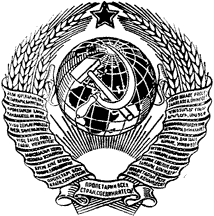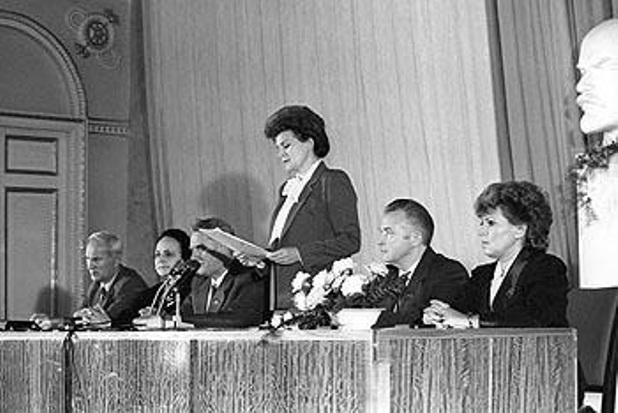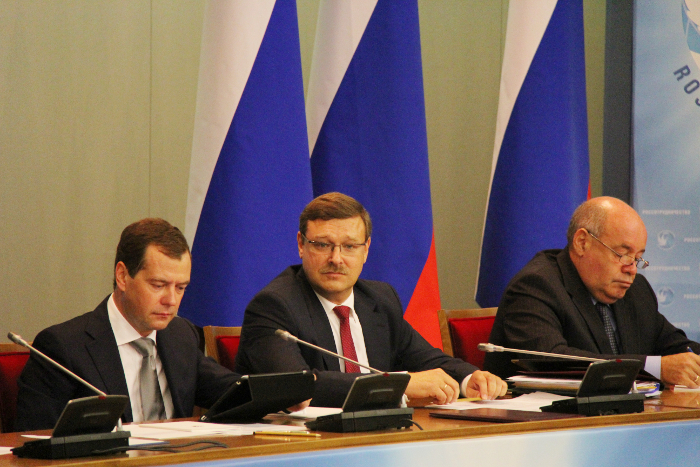 PMOH - SUHIS -CCCP- USSR - Soviet Union Historical Society - International Bureau St. Petersburg - Russia "Social Justice - Human Rights - Peace - International Friendship & Solidarity" |
 | |||||||||
Union of Soviet Friendship Societies and Cultural Relations with Foreign Countries |
|||||||||
 |
A large voluntary union of Soviet public organizations established to develop and encourage friendship and cultural cooperation between the peoples of the Soviet Union and foreign states. The union was founded in 1958 to replace the All-Union Society for Foreign Cultural Exchange, which was established in 1925. Its highest body is the ail-Union conference, convened in 1958, 1967, and 1974. The governing body between conferences is the council, and the executive body is the presidium. In 1975 the union consisted of 63 friendship societies, assigned to deal with various countries, including 12 socialist countries. It includes the USSR-France, USSR-Great Britain, USSR-Finland, and USSR-Italy societies, the Society of Soviet-Indian Cultural Relations, and the USSR-Arab Republic of Egypt Friendship Society. Other societies include associations for friendship and cultural relations with Arab, African, and Latin-American countries, 11 associations and sections for scientists and cultural workers, 14 republic societies, and six branches in cities of the RSFSR (Leningrad, Volgograd, Irkutsk, Sochi, Tol’iatti, and Khabarovsk). The Association for Exchange Between Soviet and Foreign Cities is also a member of the union. The union’s friendship societies include 25,000 enterprises, kolkhozes, sovkhozes, educational institutions, and scientific and cultural agencies. More than 50 million people participate in the union. | ||||||||
|
Republic societies alone annually sponsor approximately 25,000 projects dedicated to the history, science, art, and major events and celebrations of other countries, as well as to the establishment of solidarity with the peoples of Indochina, the Middle East, Africa, and Chile. The Moscow House of Friendship annually sponsors approximately 2,000 projects.
In 1975 the union maintained contact with 7,500 organizations and with public figures, scientists, and cultural workers in 134 countries. In all, 108 societies, associations, and institutes of friendship with the USSR were functioning on all continents of the world. The societies for friendship with the USSR maintained by Bulgaria, Hungary, the German Democratic Republic (GDR), Mongolia, Poland, Rumania, Czechoslovakia, Austria, Finland, France, the Democratic Republic of Vietnam, and the People’s Democratic Republic of Korea have been awarded the Order of Friendship Among Peoples. In 1975 Soviet friendship societies were awarded the following prizes from Socialist countries: the Order of Georgi Dimitrov (Bulgaria), the Order of Peace and Friendship (Hungary), the Great Star of Friendship Among Peoples (GDR), the Order of Sukhe-Bator (Mongolia), the Order of Tudor Vladimirescu First Class (Rumania), and the Order of Victorious February (Czechoslovakia). The union publishes the newspaper Moscow News (circulation, 600,000) in English, French, Arabic, and Spanish and the monthly journal Kul’tura i zhizn’ (Culture and Life; circulation, 90,000) in Russian, English, French, German, and Spanish. In 1974 the union was awarded the Order of Friendship Among Peoples. Р. Р. Сааков. - R.R.Saakov Яндекс.Словари › БСЭ. — 1969—1978
  
Russian Federation Friendship SocietiesToday (2012), the world public opinion is gaining increasingly influence on the processes in the world, and the public diplomacy is becoming one of the best exponents of the will of civil society and an equal partner of the state in international dialogue and cooperation; public diplomacy, according to the head of the Presidential Administration Sergey Naryshkin, is to "open modern Russia to the world and the world to Russia". Public diplomacy and the activities of public organizations in various countries contributed to raising such important topics as unacceptability of nuclear war, environmental protection, and the concept of sustainable development. It is civil society and its leaders who appealed to the values of justice and goodness common to all mankind, and sought to bring these values into the relations between nations. As part of public diplomacy leading global development trends are evaluated, new structures are formed, and new means to address pressing issues, including such as ethnic conflicts, are proposed. The most important feature of public diplomacy is its multi-vector policy, which allows to cover different areas, from civil participation in humanitarian cooperation and activities of friendship societies to the development of a unique cultural and information space, a so-called "Russian World". As noted by the Russian Prime Minister Vladimir Putin, "people's diplomacy has largely helped preserve the traditional good attitude between people, contributed to the normalization of bilateral ties, and lifting them to the level of trustful partnership and strategic cooperation". This belief is shared by His Holiness Kirill, Patriarch of Moscow and All Russia, who stressed the importance of ensuring that "people have the opportunity to transfer their understanding of current events and thereby influence the international situation". The main tools of public diplomacy are friendship societies – NGOs, whose activities are aimed at the development of friendly relations and comprehensive cooperation with the peoples of foreign countries. Today, major cultural and humanitarian tasks facing the Russian Federation in the international sphere are increasingly important. The main effort of friendship societies is focused on supporting and promoting the Russian language and culture of Russia in foreign countries, expanding contacts with compatriots living abroad, linking educational institutions, developing interregional cooperation and partnership in science, and maintaining inter-religious dialogue. Unfortunately, after the collapse of the Soviet Union, the level of cooperation through friendship societies declined slightly. In the crisis 1990s, many regional offices were unable to take comprehensive measures at the previous level. The revival of friendship societies as an influential institution of public diplomacy is an important task for Rossotrudnichestvo and other agencies. Today friendship societies involve prominent figures of science, art and culture, community and religious leaders. Members of friendship include: Juvenal, Metropolitan of Krutitsy and Kolomna, composer David Tukhmanov, artist Alexander Shilov, actor Oleg Tabakov, hockey player Vladislav Tretiak, TV presenter Nikolai Drozdov, literary critic Svyatoslav Belza, playwright Victor Merezhko, cosmonauts Alexei Leonov, Alexander Kaleri, Victor Gorbatko, Viktor Savinykh, Peter Klimuk and many others. A special role in the activities of friendship societies is played by the Russian Association for International Cooperation (RAMS), a public organization established in 1992 and a successor of the Union of Soviet Societies for Friendship (USSF). Today, RAMS includes more than 70 friendship societies and other public international organizations. Appreciating the role of societies of friendship with the peoples of foreign countries, Rossotrudnichestvo works closely with individual companies and major international organizations. In particular, close partnership was established with the Moscow Union of Friendship Societies, which currently includes 45 NGOs, 25 of them are the associations for friendship with foreign countries. Rossotrudnichestvo supported the initiative of the President and Government of the Russian Federation on creation of the Russian Union of Friendship Societies (RSOD) and resumption of the work of the House of Friendship with Peoples of Foreign Countries in Moscow. The proposal is also supported by the Ministry of Foreign Affairs of the Russian Federation, which is ready to render necessary assistance in the establishment of the Russian Union of Friendship Societies, as well as to be one of its founders. According to Deputy Foreign Minister Alexei Borodavkin, the "new public organization can provide substantial support to the efforts of Russia in the international arena, and become the vanguard of Russian public diplomacy." Ref: ruseng.rs.gov.ru  PAMC (RAMS) Conference Moscow , 24 May 2011
RNA - Russian Association for Intl Coop. - over 70 Friendship Societies
| |||||||||






